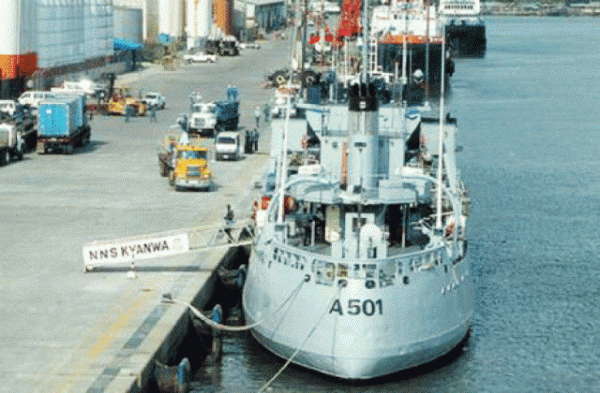Stakeholders under the aegis of Lagos Shippers Association have taken a swipe at the National Inland Waterways Authority NIWA over the fate of Onitsha and Baro River Ports both rehabilitated by NIWA as both have been placed under lock and key. This development left the stakeholders wondering why the necessary and first things that would have made the ports operational were not done first before their rehabilitation.
Recall that the Onitsha River Ports Complex rehabilitated by NIWA at the cost of N4.6 billion has been under lock and key while some of the facilities are rotting away. At the last check, it was gathered that plans were being concluded to pre-qualify eligible concessionaires for the port, located in Anambra State, more than three years after it was completed and commissioned.
President Muhammadu Buhari had also penultimate week commissioned the Baro River Port built at the cost of N6billion with fun fare, and has also been placed under lock and key while plans are being concluded to commence the concession programme just like the Onitsha Port.
President of the association, Rev. Jonathan Nicol, who spoke in an interview, in Lagos, said that the inability of the government regulatory agency for the river ports, the NIWA to give the right advice and direction was responsible for the ugly fate that has befallen the two River Ports, which were designed to remove pressure from the existing seaports, especially those in Lagos, which are perennially congested.
According to him, the Niger River, which is the source of water for both ports, has its natural course, which has very low draft, especially during the dry season and therefore cannot take even barges. He also said that there is little draft between Pattani and Onisha during the rainy season, which brings about large heaps of sharp sand during the dry season, which inhibits easy navigation.
He argued that what NIWA or any other relevant agency of the Federal Government would have done is to build a facility or infrastructure that would control the natural free flow of sand on the river, which would help it maintain a reasonable draft that can take even barges all seasons.
“You see, the River Niger has its course and during the dry season, the draft goes very low that it cannot allow the use of barges. Between Onitsha and Pattani can only thrive during the rainy season and during the dry season, you see heaps of sharp sand on the areas that have been dredged, which is a natural occurrence, which one has little or no control over.
“It is only when you build an infrastructure that can control this natural flow of sand so as to make for free flow of water all through the rainy and dry seasons from Onitsha to Lokoja, then to Baro and so on that you can now have the draft that can take barges because the Onitsha area of the river suffers the same fate, which negatively affects the river port.”
He said that the decision of NIWA to embark on the rehabilitation of the river ports even in the face of these daunting challenges was due to the very nature of Nigerian politicians, who do not want to get things right from the onset, insisting that for them, it is on records now that Onitsha and Baro River Ports have been rehabilitated and commissioned even with fun fare.
On the way forward, he noted that apart from building an infrastructure that would control the free flow of sand, another option is continuous dredging, which is very capital intensive and may therefore not be advisable since the government needs such resources in other segments of the economy.
Alternatively, he said that the government could activate the use of other seaports outside Lagos such as Warri, Port Harcourt and Calabar to reduce pressure on the existing ports in Lagos and therefore address the issue of congestion.
Meanwhile, when contacted, the General Manager of NIWA in charge of Corporate Affairs, Mr. Tayo Fadile, said it is the responsibility of the Federal Government to build airports, sea and river ports and allow the private sector to run them as the case may be.
He however said that the Federal Government through the Bureau of Public Enterprise BPE, Federal Ministry of Transport, Federal Ministry of Finance and the World Bank is undertaking the concession of the river ports to private sector operators to which NIWA has not input.
He also revealed that moves by the authority to start running the river ports on a skeletal and temporary basis were rebuffed by the government, a development that left the authority frustrated and down since It has no power over the government.


